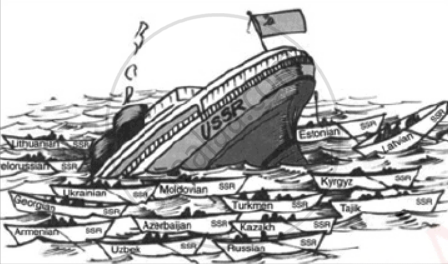Advertisements
Advertisements
प्रश्न
”The Soviet Union became a great power after the Second World War. However, in no time, the Soviet system became bureaucratic and authoritarian making life difficult for its citizens.” Do you agree with the given statement? Give arguments to prove your answer.
उत्तर
The Soviet Union became a great power after the Second World War but very soon the system became very bureaucratic and authoritarian. I do agree with the given statement. Arguments in favor of the given statement are as follows:
- The Soviet economy after the Second World War was more developed than the rest of the world except for the US. It had a complex communication network and vast energy resources. The soviet state ensured a minimum standard of living for all citizens and the government subsidized basic necessities including health, education, healthcare, and other welfare schemes. The Soviet system however became very bureaucratic and authoritarian making life very difficult for its citizens.
- Lack of democracy and the absence of freedom of speech stifled people who often expressed their dissent in jokes and cartoons.
- Most of the institutions of the Soviet state needed reform; the one-party system represented by the Soviet party of the Soviet Union had tight control over all institutions and was unaccountable to the people. The party refused to recognize the urgency of the people in the 15 different republics that formed the Soviet Union to manage their own affairs including their cultural affairs.
- Although on paper Russia was only one of the 15 republics that together constituted the USSR, in reality, Russia dominated everything and people from other regions felt neglected and often suppressed. Thus, we can say that indeed the Soviet Union became a great power after the Second World War but very soon the system became very bureaucratic and authoritarian.
APPEARS IN
संबंधित प्रश्न
Which one of the following was NOT given primacy by the makers of the soviet system?
(a) Abolition of private property
(b) Society based on the principle of equality
(c) No opposition party to be allowed
(d) No state control over economy
Mention any four names of the countries belonging to the SAARC
Which among the following statements that describe the nature of the Soviet economy is wrong?
Arrange the following in chronological order:
- Soviet invasion of Afghanistan
- Fall of the Berlin Wall
- Disintegration of Soviet Union
- Russian Revolution
Fill in the blank:
_________________ was the military alliance started by the USSR.
Fill in the blank:
____________________ party dominated the Soviet Union’s political system.
Mention any three features that distinguish the Soviet economy from that of a capitalist country like the US.
The Soviet Union invaded Afghanistan in the year ____________.
Bolshevik Communist party was founded by ____________.
The USSR came into being after the socialist revolution in Russia in the year ____________.
The successor country to the Soviet Union is ____________.
The revolution of Russia in 1917 was inspired by Ideals?
The warsaw pact was ____________.
The collapse of which country is known as the collapse of ‘Second World’.
In which year Warsaw Pact was disbanded?
How many Union Republics were there in U.S.S.R.?
Which among the following statements about Soviet System is not true?
Study the following diagram and answer accordingly.

What led to the dissolution of the Soviet Union?
Read the following passage and answer accordingly.
A coup took place in 1991 that was encouraged by Communist Party hard-liners. The people had tasted freedom by then and did not want the old style rule of the Communist Party.
Boris Yeltsin emerged as a national hero in opposing this coup. The Russian Republic, where Yeltsin won a popular election, began to shake off centralised control.
Power began to shift from the Soviet centre to the republics, especially in the more Europeanised part of the Soviet Union, which saw themselves as sovereign states. The Central Asian republics did not ask for independence and wanted to remain with the Soviet Federation.
In December 1991, under the leadership of Yeltsin, Russia, Ukraine and Belarus, three major republics of the USSR, declared that the Soviet Union was disbanded.
The Communist Party of the Soviet Union was banned. Capitalism and democracy were adopted as the bases for the post-Soviet republics.
The declaration on the disintegration of the USSR and the formation of the Commonwealth of Independent States (CIS) came as a surprise to the other republics, especially to the Central Asian ones.
The exclusion of these republics was an issue that was quickly solved by making them founding members of the CIS. Russia was now accepted as the successor state of the Soviet Union.
It inherited the Soviet seat in the UN Security Council. Russia accepted all the international treaties and commitments of the Soviet Union. It took over as the only nuclear state of the post-Soviet space and carried out some nuclear disarmament measures with the US. The old Soviet Union was thus dead and buried.
Which were the three major republics of the USSR?
Who was the founder head of the USSR during the most difficult period following the revolution (1917-1924)?
What was the military alliance started by the USSR?
The Union of Soviet Socialist Republics (USSR) came into being after the Socialist Revolution in Russia in
Which of the following statements was not a feature of the Soviet System?
Which of the following factors makes Russia a powerful country in the world?
